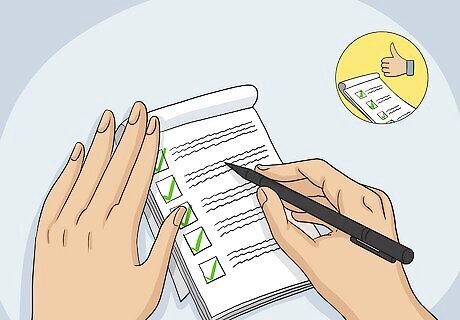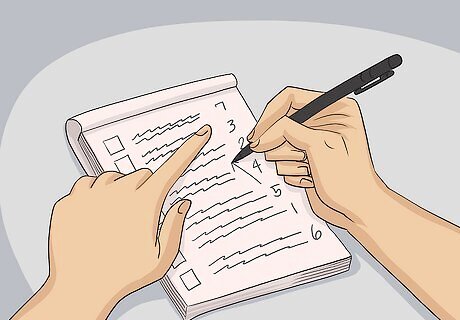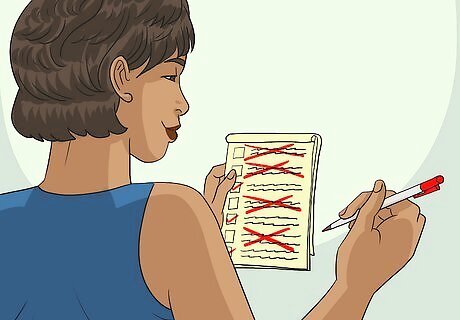
views
Listing Your Choices

Write out all the possibilities. Any time you've got to make up your mind, it's a good idea to write things down. Some studies show that writing lists help to feel an immediate sense of accomplishment, just from organizing your thoughts into list form. This is often the first step in helping to accomplish tasks and make decisions. Even if you've only got two decisions, write them down. This will allow you to start filling in details about each decision, creating a little flow chart that will help you decide. As you write, try to come up with alternative possibilities as well. If it seems like you've only got two choices, try to come up with out-of-the-box alternatives as well.

Write out the benefits of each. Underneath or beside each possibility on your list, write out the benefits or the "pros" of each choice. What will making that particular decision gain you? How will you stand to benefit from that decision? What's the upside? List out all the ways in which that choice would be a good one. Consider the benefits in and of themselves, as well as side benefits. If you're trying to decide what college you want to attend, it's good to consider benefits about one college offering internships to all students, as well as the reputation for fun. Both things are important considerations.

Write out the risks for each. After you consider the pros, consider the cons. What do you stand to lose by making this decision? What will be difficult, or challenging about completing this task? What might end up going poorly, if you choose to pursue this avenue? Try to consider all the ways you might fail. Consider a variety of cons, like time commitments, difficulty, and other aspects of the choice. Try to be realistic. If you're trying to pick a career path, it's true that being a novelist could make you a millionaire, but it's rare to crack through to that millionaire success level.

Order the different choices by difficulty. In some cases, the challenge of a particular task might be a pro or a con. Depending on the kind of choice you're making, it's good to organize your options in terms of the difficulty involved in each choice, so you can pick the best possible outcome that you'll be able to pull off. After you go through and list out each of your options, arrange them from most to least difficult, or vice versa.

Think outside of the box. If all of the options seem unattractive to you, try to do a little innovating. Think of a non-traditional way of solving your problem to make yourself happy. Try to look beyond one or two options and find other creative and elegant solutions to the problem that you're trying to solve. If you're trying to decide what you want to make for dinner, and all you've got in the cabinet is canned tuna and Ramen noodles, think about all the other options you've got. You could go out to eat. You could run to the store really quickly. You could call a friend and see what they're having. Don't limit yourself.
Weighing Your Options

Ask for advice from friends and family. If you're trying to make a big decision about finances, school, or a romantic relationship, it's always a good idea to talk to someone older than yourself. Talk to someone who has been there before and ask for guidance. They'll usually be able to point you in the direction of things you might not have thought of before. Friends and relatives typically enjoy being consulted as experts. People are almost always willing to help you come to a decision, or weigh your options. Don't expect an answer, but just try to talk it out together. Instead of saying, "What should I do?" say something like, "What's the best way tot think about this?" or "How would you think about this?" It's ultimately your decision to make.

Consult some experts. If you're trying to make a difficult choice, think about how one of the pros would do it. Consult teachers for school decisions, colleagues for workplace decisions, and people with strong relationships for relationship advice. If you're trying to decide where you want to go to college, or what you want to do for a particular school project, talk to one of your teachers. They'll help you think about the options from an informed perspective. Experts don't have to be experts at the thing you're talking about. Look at some role models, or experts at life. How would Slash handle your relationship problem? What would Lady Gaga say to the bully who's messing with you?

Do your own research. It's important to go past what your impression of a particular choice and learn what it is actually like. If you're trying to decide what to eat for dinner to help you lose weight, make sure you research how many calories are in a particular dish before you cook it. Just because chicken quesadillas might sound healthy doesn't make them so. It's important to avoid what's called "groupthink." Sometimes, you can only see the popular or the common solutions to problems, and it keeps you from coming up with creative alternatives. It's important to look into your solutions yourself and keep other people's opinions at a slight distance.

Visualize the future. Think about what would happen in the future if you choose a specific option. If your boss told you that you have to relocate somewhere far away for your job, think about your family, friends, and other close relatives, and how it would affect them. Look into what the city would be like to live in. Consider how the move might benefit you. Try to imagine what it would really be like. Even things as small as deciding what to wear benefit from a little visualizing. Try on each dress. Take pictures and send them off to a particular friend to help make the choice.

Give it a rest for a while. Sometimes, there's a point at which you can think too much about a particular choice. Sometimes, two colleges will both be excellent and you can imagine yourself being happy at each. Continuing to dig and dig for some little thing that will turn you on or off of one of the choices can be more aggravating than helpful. Instead, put it aside and go about your life for a while. One option may grow on you with some time.
Making the Choice

Narrow your list. It's much easier to make a decision when you've got fewer choices. When it's time to make your decision, try to limit yourself to choosing between no more than two or three. Cross out the options that are too difficult or unattractive to actually go with, and then weigh the remaining options to make your decision. Eliminate any impossible choices. If the difficulty of a particular task is so great its risks outweigh its rewards, cross it out. It might be awesome to be a movie star, but it might be too difficult to take seriously as an option. Cross out any unattractive options from the list. If you just can't stomach the idea of attending a particular school, or of moving to a particular place, then cross it off the list. Don't consider something just because it has an upside. If you don't like it, don't do it.

Consider the time-frame of the decision. Sometimes, it's important to consider how long something will take to accomplish, and how much time you can afford to devote to it. Consider what's most pressing and how you can use your time most wisely. What needs to happen first? try to prioritize the most important decisions and choices to put them up front. Think about how best to use your time wisely. If you're trying to decide how to fill the afternoon, something like "start rebuilding the engine" might be a little ambitious for the next three hours, or it might be a great way to spend the time.

Trust your own judgment. Ultimately, you're just going to have to go with your gut at some point. If you feel yourself drawn to one option over another, that's a fine reason to pick it. Don't overthink it. Sometimes, you've just got to decide. Try this exercise: Describe the decision you've got to make, as if you were someone else looking at the situation objectively. What would you have to say to the person trying to make the choice?

Sleep on it. If you've made your choice, make it tentatively. Don't make your decision final until you can live with it for at least 12 hours or so. Wait until you are ready for bed to go over all the pros and cons a final time, then sleep on the decision. The next day, write down which seems the best fit. If it still sounds good in the morning, go with it. Sometimes your subconscious works out the details while sleeping!

Try not to second guess yourself. Once you've decided, stop considering the other options. It can drive you crazy to start second-guessing yourself after you've made the choice and it's too late. Go for it and don't look back.




















Comments
0 comment